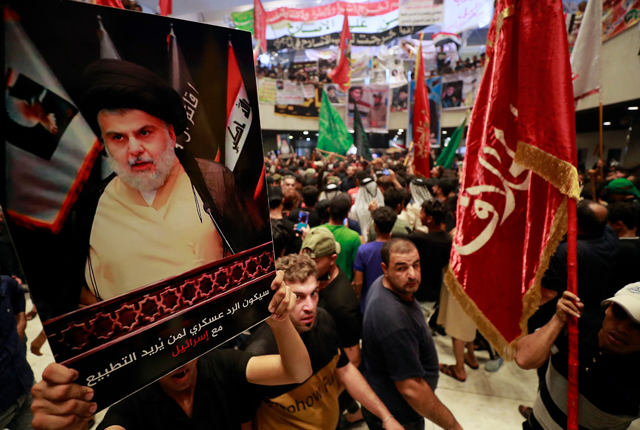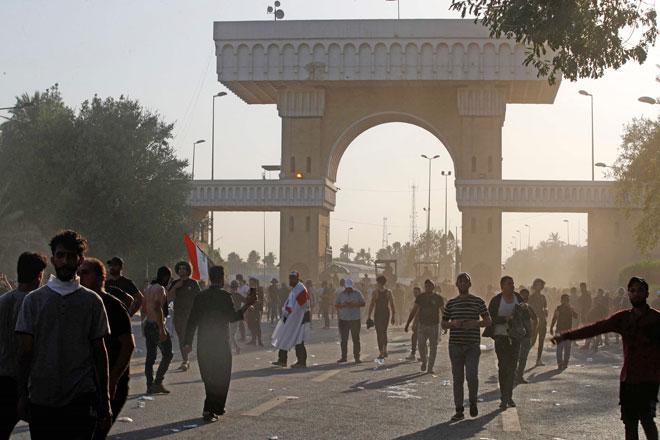You are here
Iraq’s Sadrist camp refuses to join new government
By AFP - Oct 15,2022 - Last updated at Oct 15,2022

In this file photo taken on August 2, supporters of Iraqi cleric Moqtada Sadr (image), protest against a rival bloc’s nomination for prime minister, in the capital Baghdad’s high-security Green Zone (AFP photo)
BAGHDAD — Iraqi firebrand cleric Moqtada Sadr’s movement on Saturday announced its refusal to join a new government being formed by prime minister-designate Mohammad Al Sudani.
The announcement came two days after lawmakers elected Abdul Latif Rashid as Iraq’s new president, and he swiftly named Sudani as prime minister in a bid to end a year of political gridlock since October 2021 elections.
“We stress our firm and clear refusal for any of our affiliates to participate... in this government formation,” Mohammed Saleh Al Iraqi, a close associate of Sadr, said in a statement posted on Twitter.
The 52-year-old Shiite former minister Sudani has the backing of Sadr’s Iran-backed rivals, the Coordination Framework, which controls 138 out of 329 seats in the Iraqi legislature.
In June, Sadr had ordered the 73 lawmakers in his bloc to resign, leaving parliament in the hands of the Framework, which includes representatives of the former paramilitary Hashed Al Shaabi.
In his statement Saturday, Iraqi charged that the upcoming government has a “clear subordination to militias” and would “not meet the people’s aspirations”.
The Sadrist official said the movement refused to take part in any government led by Sudani “or any other candidate from among the old faces or those affiliated with the corrupt”.
“Anyone who joins their ministries does not represent us... rather, we disavow them,” Iraqi said.
Snap elections were held last year following nationwide protests that erupted in October 2019 to decry endemic corruption, decaying infrastructure and the absence of services and jobs for youth.
The stakes are high for the next Cabinet, with a colossal $87 billion in revenues from oil exports locked up in the central bank’s coffers.
The money can help rebuild infrastructure in the war-ravaged country, but it can only be invested after lawmakers approve a state budget presented by the government, once formed.
Sudani vowed on Thursday to push through “economic reforms” that would revitalise Iraq’s industry, agriculture and private sector.
The prime minister-designate also promised to provide young Iraqis “employment opportunities and housing”.
Sadr, who has the ability to mobilise tens of thousands of his supporters with a single tweet, has repeatedly demanded early elections, while the Coordination Framework wants a new government in place before any polls are held.
Tensions between the two rival Shiite camps boiled over on August 29 when more than 30 Sadr supporters were killed in clashes with Iran-backed factions and the army in Baghdad’s Green Zone, which houses government buildings and diplomatic missions.
Related Articles
BAGHDAD — Iraq's new prime minister-designate Mohammed Shia Al Sudani hails from the Shiite Muslim political class that has been in power fo
BAGHDAD — Iraq's newly-elected President Abdul Latif Rashid pledged on Monday on taking office to throw his weight behind efforts to rapidly
BAGHDAD — Eight protesters were killed and Iraq declared a nationwide curfew after supporters of Moqtada Sadr stormed the government palace
















